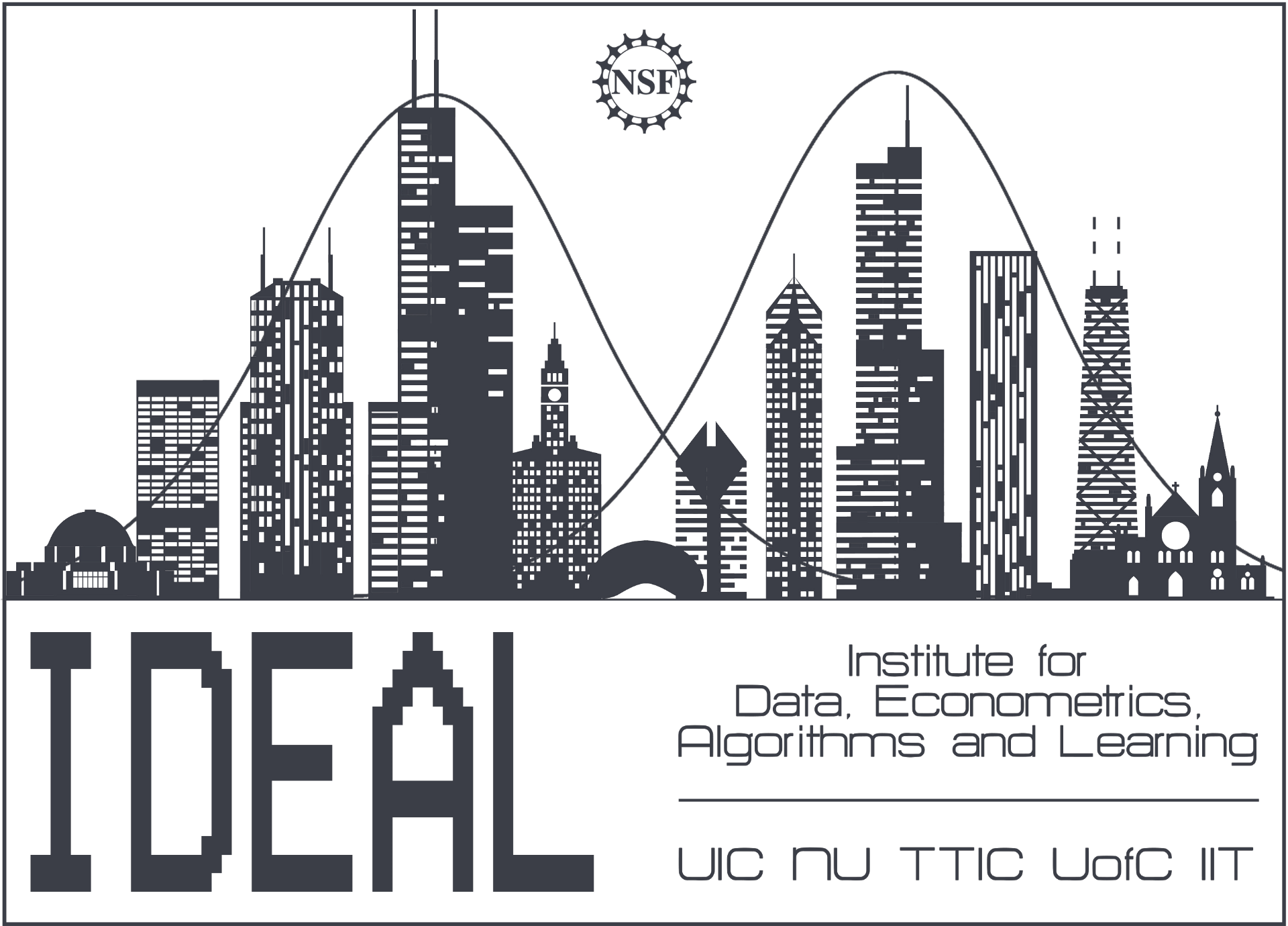Monday, June 9th, 2025
Logistics
Date: Monday, June 9th, 2025
Location: University of Illinois Chicago, Lecture Center F, Chicago, IL 60607
Parking: Attendees may park at any of the visitor lots. The closest ones to the workshop are Lot 5C and HLPS. https://parking.uic.edu/wp-content/uploads/sites/277/2024/08/Parking-Map.pdf
Parking passes will be provided at the workshop for free parking in designated UIC parking buildings. Please remember to ask for a pass before leaving the workshop.
Registration: https://forms.gle/ZAjr1eyphPJDFamTA
Description:
Schedule
9:00 AM – Light Breakfast
9:10 AM – Faculty Session (20 minutes per talk)
- Lev Reyzin (UIC)
Welcome Remarks - Zhiyuan Li (TTIC)
PENCIL: Long Thoughts with Short Memory - Chao Gao (University of Chicago)
Conformal Prediction with Volume Guarantee - Steven Keith Platt (Loyola University Chicago)
Fine-Tuned LLMs for High-Accuracy HPO Term Normalization in Precision Medicine
10:40 AM – Student Session (10 minutes per talk)
- Gene Li (TTIC)
The Role of Environment Access in Agnostic Reinforcement Learning - Shishir Adhikari (UIC)
Inferring Causal Effects in Networks Under Heterogeneous Peer Influence - Vaidehi Srinivas (Northwestern University)
Online Conformal Prediction with Efficiency Guarantees - Yifan Wu (Northwestern University)
Perfectly Truthful Calibration Errors - Alec Sun (University of Chicago)
How to Sell a Service with Uncertain Outcomes - Bob Guo (Northwestern University)
Agnostic Learning of Arbitrary ReLU Neuron Under Gaussian Marginals
12:00 – 1:30 PM – Lunch Break (lunch is provided)
1:30 PM – Keynote Presentation (40 minutes)
- Sidhanth Mohanty (MIT → Northwestern University)
Markov chains beyond rapid mixing: inference and optimization
2:30 PM – Postdoc Session (20 minutes per talk)
- Dravyansh Sharma (TTIC)
Principled Hyperparameter Tuning and Algorithm Selection - Idan Attias (UIC)
Capacity-Constrained Online Learning with Delays: Scheduling Frameworks and Regret Trade-offs - Rajni Dabas (Northwestern University)
Clustering with Fair Outliers
3:45 – 5:00 PM – Industry Panel on “Opportunities for Engagement between IDEAL and Industry”
Panelists: Alekh Agarwal (Google), Vince Conitzer (CAIF and CMU), Eunyee Koh (Adobe), Ravi Kumar (Google), Samir Khuller (Northwestern), Arunava Majumdar (Open Development Platform)
Moderators: Elena Zheleva (UIC) and Aravindan Vijayaraghavan (Northwestern)
Keynote speakers
Sidhanth Mohanty
Title: Markov chains beyond rapid mixing: inference and optimization
About IDEAL
The Institute for Data, Econometrics, Algorithms, and Learning (IDEAL) is a multi-institution and transdisciplinary institute led by the University of Illinois Chicago in collaboration with Northwestern University; Toyota Technological Institute at Chicago; the University of Chicago; and Illinois Institute of Technology, in partnership with members of the Learning Theory team at Google. The institute involves more than 60 researchers working on key aspects of the foundations of data science across computer science, electrical engineering, mathematics, statistics, and fields such as economics, operations research and law. Research will center around the foundations of machine learning, high-dimensional data analysis and inference, and data science and society. Topics include foundations of deep learning, reinforcement learning, machine learning and logic, network inference, high-dimensional data analysis, trustworthiness and reliability, fairness, and data science with strategic agents.
Parking visual for UIC:

